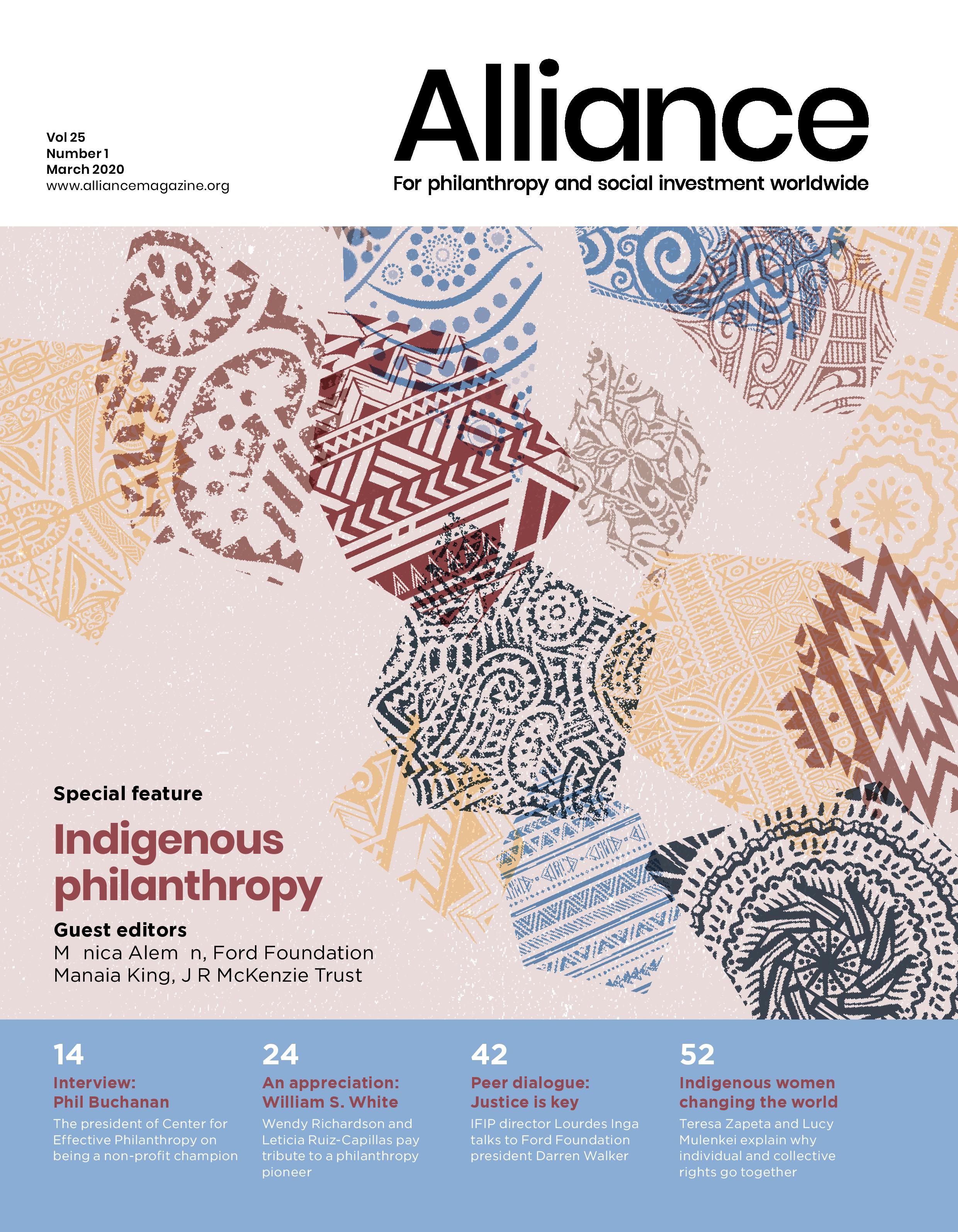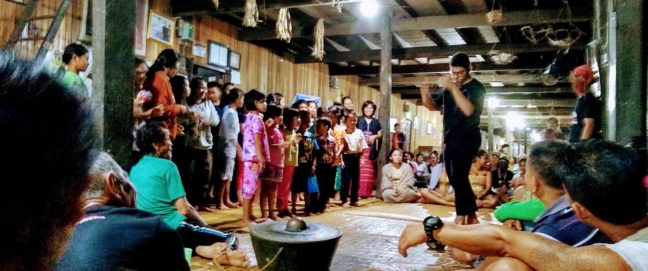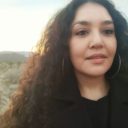Lourdes Inga (Peruvian of Quechua descent) of the International Funders for Indigenous Peoples talks to Darren Walker, president of the Ford Foundation about the importance of placing Indigenous perspectives centre-stage
Lourdes Inga: International Funders for Indigenous Peoples (IFIP) has now run for 20 years and we wanted to use the special feature of this edition of Alliance both to share the work of our members, including the Ford Foundation, to support Indigenous people and to expand our influence and reach new audiences. So I’m delighted, Darren, that you agreed to do this interview. First of all, I noticed that among the pieces you’ve written since you became president of the Ford Foundation, and in your recent book[1], you talk about Indigenous Peoples and I wondered what has shaped your views and Ford’s decision to work with them?
Darren Walker: For years, Indigenous Peoples have tried to help governments and other institutions whose mission is development and social change to understand that we can’t have development and social progress without putting the people who are closest to the challenge at the centre of our work. And so for the Ford Foundation, it is a natural thing to see Indigenous people as essential to unlocking the solutions to the problems we are facing in the world.

In the Colombian Amazon, Indigenous women leaders came together for assembly of the Coordinating Body for the Indigenous Organizations of the Amazon.
LI: What have you drawn from your personal experience of working with Indigenous Peoples and their organisations?
DW: First of all, while there are unique characteristics of the very heterogeneous community of Indigenous Peoples around the world, they have some similar experiences to other excluded communities. For example, the experience of being overlooked and not respected by mainstream societies and by the institutions like foundations and development agencies who are supposed to be helping solve problems. One of the reasons we have not made as much progress as we should have is because we have not fully understood the needs and priorities of the very communities we are missioned to serve. Bryan Stevenson[2] speaks from the experience of being an African-American when he talks about the need to be proximate. In order to build a more just world, privileged institutions need to get more proximate to the people and communities they are seeking to help. This is a global phenomenon across all societies, and in some cases, it manifests itself in attitudes to Indigenous communities – in Brazil, with Indigenous Peoples and Afro-Brazilians, in the US with Native Americans and African-Americans, and in India with the Dalits.
LI: I want to pick up on that idea. I’ve been around really amazing Indigenous leaders and one in particular comes to mind, of Australia. At the IFIP Pacific Regional Hui in New Zealand, he asked philanthropy to listen to us deeply. To walk with us not in front of us, but beside us as friends, partners, and co-imaginers. One of the things we need to look at is how we move away from sometimes forgetting to acknowledge that Indigenous communities know what their solutions are and coming with what we think are the solutions.
DW: I think that comes from the way in which governments and philanthropy have privileged their own acquired knowledge over the authentic experience of people closest to the challenge. Villages across Africa are littered with the carcases of agricultural equipment and water and sanitation projects that did not work because the knowledge and voice of the very people in those communities was overlooked in the planning and implementation and ultimately, they weren’t sustained. I’m not saying that’s the only reason, but there is no doubt that it’s only in recent years that we working on international development, human rights and social justice have come to fully understand how our privilege blinds us to the solutions that are in the hands and heads and hearts of Indigenous Peoples.
If our mission of dignity for all is to be achieved, it will only be achieved if we recognise the full humanity and full rights and the leadership potential of Indigenous Peoples. It’s that simple.
LI: I think you’re right. Justice is a big piece of it. In 2015, you sent a video to ECMIA, the Continental Network of Indigenous Women of the Americas which met in Guatemala, and it was nice to hear your message to the over 200 Indigenous women who were there. I wanted to hear about your experiences of working with Indigenous organisations and how that has informed or guided Ford’s work.
DW: I think one of the most important initiatives during my presidency has been our Build programme which seeks to identify and strengthen key organisations across the entire 1,500-plus grantees and really go deep with them. Over half of the organisations in the programme are led by women, women of colour, Indigenous women. Putting them at the centre of the process showed me just how much power there is and how the perspective of Indigenous Peoples in the room can change the tenor, the understanding, the authenticity of the entire experience and make the product better, because it is more informed, it is more intelligent, it’s more realistic and it’s more likely to succeed.
LI: That’s what I’ve seen in my role at IFIP, too. It is about sharing that message with funders and others in the philanthropic sector, about listening, about also prioritising Indigenous solutions to many problems.
DW: Our work around land has been an area where I have seen very important progress, even in my own understanding. Most people, when they think about climate change, don’t think immediately of Indigenous Peoples as the solution, but when you think about the impact of the forest on our climate and that Indigenous Peoples occupy millions of hectares of land across the globe, the solution is right in front of us. The question is, are we willing to ensure their rightful ownership of these lands? Are we willing to put our privilege on the line to guarantee their agency, their legal rights? Are we prepared to spend the resources to take on the private sector which often seeks to suppress those rights? So the work that we support of Indigenous Peoples’ organisations to have autonomy and sovereignty over their land is among the most important work we do at the foundation.
We need to lift up and resource Southern-led, Southern-based and Indigenous-led organisations, because until those organisations are resourced adequately, we’re not going to make sustained progress.

Lourdes Inga and Darren Walker in discussion at the Ford Foundation offices in New York.
LI: I want to again acknowledge that Ford has led, and continues to lead the way in supporting Indigenous Peoples. But I want to go back to 2018, to when you wrote, ‘Indigenous people are doing their part, managing their lands as a legacy of their ancestors and for the benefit of future generations. Now it’s time for all of us to help, to fight for the rights of these communities, and to see the connections between how we treat people and how we treat the planet.’[3] In your new book, you interview Carly Hare (Pawnee/Yankton) of Change Philanthropy, and she said something that really struck me and which echoes what you’ve been talking about. There are still foundations or funders that approach philanthropy from a charity perspective, but there are others that are leading the way in what philanthropy should really look like, and in the context of what you’re writing and what Ford is doing, justice is key to that. We’re now in 2020, the start of a new decade. Given what you know of philanthropy and of the funding landscape, and what Ford sees you’re learning from the BUILD initiative, how would you see the state of funding to Indigenous Peoples?
DW: It is not all that it might be because the notion of Indigenous Peoples being in the driver’s seat has not always resonated, even where funders themselves are seeking to help Indigenous Peoples and communities. I think that requires a shift in mindset and the challenge of doing that is what Carly raises in my book because the root cause of these problems are prejudice, low expectation and a belief in the supremacy of Northern organisations and in solutions that work in the North. Some of them may work in the South, but they are not easily transportable. So in the new decade, we have to commit to a new paradigm of equity for Indigenous Peoples, people of colour and women, and we have to recognise that, yes, we want to support those organisations in the North that are doing authentic, grounded work, but we need to lift up and resource Southern-led, Southern-based and Indigenous-led organisations, because until those organisations are resourced adequately, we’re not going to make sustained progress. What I’m hoping in this new decade is that we will have the courage to take this on in meaningful and material ways.
Justice won’t be achieved without walking hand in hand and resourcing and supporting Indigenous Peoples, their organisations, their leadership, and believing in them. They deserve it.
LI: I’m excited to hear that. One last thought around Indigenous Peoples’ rights. How is Ford looking at Indigenous rights, and how does it work, not just in grantmaking but in other ways to influence the sector? I’m thinking about how it might also support the United Nations Declaration on the Rights of Indigenous Peoples.
DW: Certainly our grantmaking is going to continue and hopefully will grow. Secondly, we support all of the efforts to strengthen the work with Indigenous Peoples at the UN, the networking, the meetings, the ongoing engagement to build power at the UN and in other forums. We have to think about our own practices, too, our own hiring, the ways in which we interrogate our own internal bias, and really make sure that we’re doing all we can to be inclusive. In some places, that’s harder than others. For example, one of the criteria for working at Ford is proficiency in English. In some places we work, you find that Indigenous Peoples or Afro-Brazilians haven’t been given the opportunity to learn English, and so we have to work extra hard to make sure we don’t allow that to be a barrier. So we have to really look at ourselves and we have to use the platform of the Ford Foundation to proselytise the importance of this idea of the inherent rights of Indigenous Peoples. If our mission of dignity for all is to be achieved, it will only be achieved if we recognise the full humanity and full rights and the leadership potential of Indigenous Peoples. It’s that simple.

Warmayu intercultural meeting in Peru.
LI: I echo that loud and clear. I understand the challenge with language, also being an immigrant, but working with Indigenous leaders, we have to identify potential activists or others who can speak English, which then limits some of the messages but that’s the context in which we work. We’re trying to figure out how we move outside that.
DW: But the English doesn’t have to be perfect – I just say that to offer my encouragement of your work and appreciation for what you’re doing and affirm our support and belief in it.
LI: Thank you. To close, I’d like to ask what message you have for other foundation presidents and CEOs, particularly those who have not thought of including Indigenous Peoples either as a distinct programme or across their other programmes, or haven’t invested time in learning from Indigenous Peoples?
DW: This is an opportunity to improve your chances of impact. Working with Indigenous people, supporting their leadership, investing in their institutions is an opportunity for impact. So this is not ‘please do us a favour’, this is a proven way of making impact in the world and if you believe in justice, justice is calling and justice won’t be achieved without walking hand in hand and resourcing and supporting Indigenous Peoples, their organisations, their leadership, and believing in them. They deserve it.
LI: They also have leadership that is ready to share.
DW: Absolutely, leadership that is ready to be activated and that is already working. It’s not like they’re waiting for us to put them to work, they’re already working. We just need to acknowledge that they’re doing that but without sufficient resources and yet they’re determined. It’s that determination and courage that you see on the faces of those Indigenous leaders that inspires me and that compels me to do all that I can to be of some service.
Featured image provided by Ford Foundation







Comments (0)